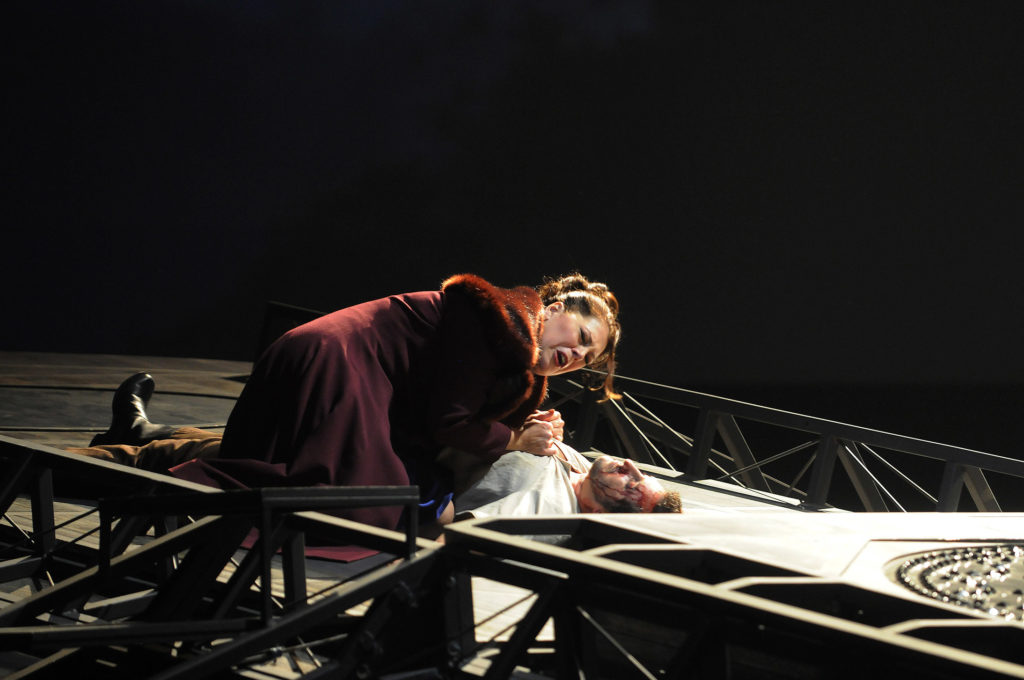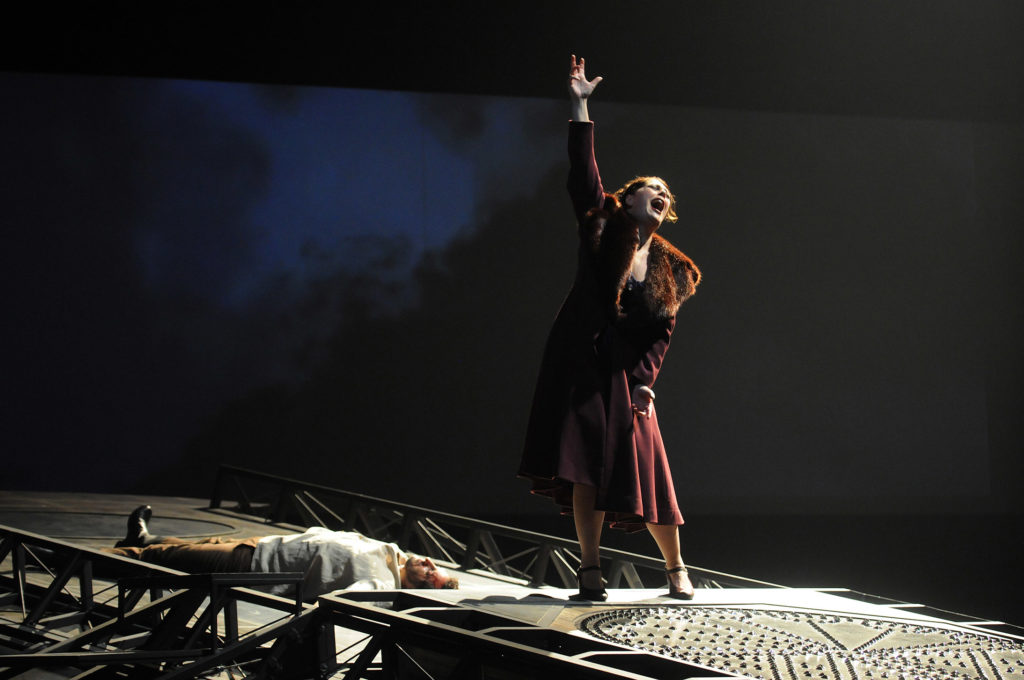
Q & A: Sondra Radvanovsky on ‘Tosca,’ Bel Canto, Verismo & Spain
By Mauricio Villa(Credit: Michael Cooper )
This summer Sondra Radvanovsky returns to the Teatro Real to close out the season in “Tosca” after opening it to great acclaim in “Un Ballo in Maschera.”
The season has seen the soprano in Spain performing at La Coruna and giving highly acclaimed performances at the Liceu in a gala with Piotr Beczala and Donizetti’s Three Queens Concert. She is scheduled to return next season for performances of “The Queen of Spades” at the Liceu.
During rehearsals of “Tosca,” Radvanovsky spoke to OperaWire about her upcoming performances as the iconic diva, upcoming roles, the Bel Canto repertoire, and her love for Spain.
Operawire: You have stated numerous times that you fell in love with opera after seeing a broadcast of “Tosca” sung by Plácido Domingo when you were 11 years old. Could you imagine back then that Tosca would become one of your signature roles?
Sondra Radvanovsky: I think it was a secret desire of mine. It was the first opera I saw and I think it was the music, the acting that was appealing. So would I think I would be singing it? Probably. To be honest, I started working on “Tosca” when I was 19 years old, so it was obviously the role that I have always wanted to sing. And yeah! Domingo really inspired me. I think it was the right opera at the right moment of my life. Through the years my personification of Tosca has developed, but I have always considered, and in this production by Paco Azorin especially, that Tosca is a woman with a gift that is her voice. She’s not a “Diva” to me, but an emotional human being.
OW: Do you think the opera deals with themes that could be strong and inappropriate for such a young age? Were you shocked by the violence in it?
SR: No! It was the opposite, I loved it. I was very mature back then and I have always liked cinema. Even today when I am watching a film, I am so into it that my husband sometimes complains that I don’t pay attention to him, but I am so into it. The same happened with opera when I saw that “Tosca.” It’s what I have been doing during my career; “being really focused on the moment and on the action.”
OW: One of the most fascinating things you tend to do in music is emote and sometimes speak the words rather than sing them. Can you tell me about that choice?
SR: Well I think you have to. One thing I have learned in my life after my father died, is to live in the moment, live right where you are right now. So, the moment I am on stage I feel that I am that person, and if I get distracted, I constantly remind myself; Come back to the moment, and it is sometimes really hard. We, singers tend to edit all we have done. “That was not as good as it should be” or “why did I move there” or ”why did I fall.?” There is always something that might distract you, like that B flat in “Vissi d’arte,” but I remind myself that I am Tosca and I am in this moment right now.
OW: After so many years of performing this role, do you know how many you have sung?
SR: Well, I am not sure but definitively more the 200, although “Il Trovatore” is the opera I have sung the most which would be around 300 performances. So, “Trovatore” is number one, and “Tosca” is number two. I have one more contract of “Trovatore” this October in Munich and that will be my last. I think people have heard my Trovatore enough. It is always nice to get back to it as I did in Paris. I hadn’t sung “Trovatore” for so many years, and it was like getting back into a bicycle and riding it again. It is a role, well not simply a role, Leonora is a person so close to me. So, who knows? Maybe I will do it again after Munich, but I am directing my career towards roles like “Turandot.”

© A Bofill
OW: Tell me about that direction and what roles will it include? Have you already received an offer to perform “Turandot?”
SR: In the next four seasons “Turandot” is happening and it will be released on CD and DVD. My role debut is being recorded. Unfortunately, I cannot tell you the whole cast yet as it hasn’t been announced to the press. “Attila,” in concert version, has been announced for next season and other roles I have already signed are “La Forza del Destino,” “Gioconda,” “Medea,” and “Il Tabarro.”
OW: Are you considering any Wagner works?
SR: Not at all. But it is not about the music but about the language, and I don’t speak German. Wagner, and Strauss too, are so conversational, and if you don’t speak the language, it’s twice the work. I was offered the whole Ring Cycle, Brünhilde, and I spent three months listening to it, studying it, and asking the people that I have with me. Every singer should have those five people whom you trust and know your voice even better than the singer itself, to refer to. You might have too many thoughts and feelings that might be confusing. So I asked them. Can I sing it? And the answer was yes. Should I sing it? And the answer was no. So I got back to the theater which offered me the role and kindly refused. And somehow Wagner’s music doesn’t speak to me.
Renata Scotto told me once, “If you don’t love what you are singing the audience will know.” And I really love the Italian repertoire and speak Italian. It’s in my DNA. I don‘t want to end my career singing roles that might work or not. One of my friends told me that he would really like to see me as Brünhilde, but I thought, What if I fail miserably? Would I want to end my career like that?
OW: One of the most interesting things about your career path was how you transitioned from Verdi and verismo roles to Bel Canto roles and became one of the most acclaimed singers in the repertoire. Tell me what made you decide to take the step into Bel Canto?
SR: I did some “Don Pasquale” scenes back in college, but it’s true that “Lucrezia Borgia” was my first Bel Canto role. I was going into all this heavy repertoire when I was at the young artist program at the Met. I was offered “Luisa Miller” and I opened the score and looked at the first aria and said, “there is too many black notes, I cannot sing that.” And they said: “Yes you can, and you are going to have great success.” So, I went to those five people I mentioned before that I really trust, and they said I could do it. So I began to work on it. And that was the key to me for Borgia and the Bel Canto repertoire. But it was a process, someone heard something in my voice and I was offered “Aida” when I was 25 years old, and I luckily said “no.” Instead, I went into the Met young artist program and when I did the Met Council Auditions, I sang Aida’s “Ritorna vincitor” because I did not have a high C. The teachers just heard my dark color, which I had at 25. But I did not have a thick column voice, like Deborah Voight for example, and people easily confused color and volume. Even today I don’t have that kind of thick column voice. I could compare my voice with Michael Fabiano, but I don’t have the Anna Pirozzi quality voice. Mine is definitively a higher line voice that blossoms at the top and I have to work to make the middle and the lower register bigger.
I know that I am 52 and my voice is naturally filling in. When I started working on “Luisa Miller” and “Il Trovatore” a light went off and I learned how to sing “agilita.” That was the key that opened the door. Most people go heavier and darker with age and my voice went backwards. Then as it is well known, I had surgery in my vocal cords when I was around 30, before singing “Borgia.” While I was recovering, I learned how to sing this music and how to sing properly. It allowed me to have a clean slate without vocal cords that were always giving me trouble. Before there was always a hitch in my voice when the cords went through the upper passagio. But my passagio is around F and that’s one of the reasons which made me realize I was a higher soprano because the spinto soprano’s passagio starts on E flat. That’s when I learned how to develop my voice naturally. That is why the hardest parts in “Tosca” are the ones in the chest voice, not the high notes.
OW: Tell me about singing “Lucrezia Borgia” and how you eventually went on to sing something like “Il Pirata?”
SR: “Lucrezia Borgia” was extremely difficult, I wish I had sung something like “Il Pirata” before because “Il Pirata” is easier for me. It is long but the passagio is lower. “Borgia’s” last scene is cruel.
With “Il Pirata,” I love doing it because of the Callas ring, it was one of her roles. I really love singing “Il Pirata” and we did a streaming concert version in Napoli last year, but I am not too happy with the result of the sound. The mics were just too close, I asked to separate the mics, but the engineers did not agree and my voice sounds too metallic. Unfortunately, I have no future plans for a stage version of “Il Pirata.”

© A Bofill
OW: Over the past few years you have performed the Three Donizetti Queens in concert and in productions and have also continued to sing roles like “Tosca” at the same time. How have you been able to manage this shift in repertoire? Is it your technique or is it because of the true nature of your voice?
SR: Well I try to give some space between those roles, because singing the three Queens is like walking on a tight rope, and you have to live like a nun because I need to be in perfect health physically and vocally. It’s a real challenge. But I love it. Besides, so many singers say that Mozart’s repertoire is like medicine for the voice, but for me, it is like wearing a straightjacket. It doesn’t feel comfortable to me and also I don’t relate to it. I have only sung Donna Anna, even though I have been offered many Mozart roles. I love listening to Mozart’s music. But for me, I need the freedom and the agility of the Italian repertoire of Bellini and Donizetti. That is my medicine for the voice.
When I sing the heavier repertoire like “Andrea Chenier” or “La Gioconda,” you still need this legato floating quality in the lines. You cannot sing it like Brünhilde. So whenever I have problems singing the bigger repertoire I go back to “Casta Diva” or “Ah! dolce guidarmi.” After all Verdi, Puccini, and Verismo are an evolution from composers Rossini, Bellini, and Donizetti. So when I face dramatic roles, I just try to find this Bel canto quality and enlarge it. I put a little bit more voice and volume but it is still the same path we walked before, and I think so many singers forget that. I blame the singers and their teachers. Singers want everything right now because we live in a society that is disposable, that wants instant gratification, and we are great consumers. We take things, we use them up and throw them away. I think we have to respect what we had in the past, the history of opera, and look where we came from. So many singers don’t see that and forget that. We have to acknowledge the great singers of the past.
As for teachers, I fear they teach the same technique to every singer and every voice is different. Just look at the anatomy, faces have different shapes and when I teach a singer, I look at how their faces and bodies are and I use that knowledge to improve their singing. Otherwise, all voices tend to sound the same. We all love Callas, and some singers want to sound the same and duplicate. I remember that James Levine introduced me to Leontyne Price and told her, “She is the new you,” and she replied, “No, be the one and only you.” I said, “Thank you.” I don’t want to sound like Price or Callas, I just want to sound like me.
OW: Are you considering any more Bel Canto in your future?
SR: Not really, I don’t think people see me that way anymore now that I will be getting into Verismo figure. But it is ok, it takes a lot of work to sing Bel Canto, and I have had so many challenges already doing “Norma,” “Pirata,” the three Queens. I want to take it a little bit easier right now.
OW: You opened and will close the Teatro Real season and also are a Liceu regular. What attracts you to Spain and its theaters?
SR: I feel that Spain is my home, and I truly feel love from the audience. The reception I got from my Three Donizetti Queens concert at the Liceu recently was overwhelming. My husband and I are considering moving to Spain. I think it’s time to leave the States.


